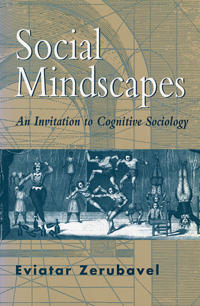Elephant in the Room, The: Silence and Denial in Everyday Life (Inbunden)
avEviatar Zerubavel
ISBN: 9780195187175 - UTGIVEN: 2006-03-09The Elephant in the Room (Häftad)
avEviatar Zerubavel
ISBN: 9780195332605 - UTGIVEN: 200711The fable of the Emperor's New Clothes is a classic example of a conspiracy of silence, a situation where everyone refuses to acknowledge an obvious truth. But the denial of social realities--whether incest, alcoholism, corruption, or even genocide--is no fairy tale. In The Elephant in the Room, Evi[...]
Ancestors and Relatives (Inbunden)
avEviatar Zerubavel
ISBN: 9780199773954 - UTGIVEN: 2011-11Genealogy has long been one of humanity's greatest obsessions. But with the rise of genetics, and increasing media attention through television programs like Who Do You Think You Are? and Faces of America, we are now told that genetic markers can definitively tell us where we came from. The problem,[...]
Time Maps (Häftad)
avEviatar Zerubavel
ISBN: 9780226981536 - UTGIVEN: 200411""Time Maps" extends beyond all of the old cliches about linear, circular, and spiral patterns of historical process and provides us with models of the actual legends used to map history. It is a brilliant and elegant exercise in model building that provides new insights into some of the old questio[...]
The Fine Line (Häftad)
avEviatar Zerubavel
ISBN: 9780226981598 - UTGIVEN: 199308Eviatar Zerubavel argues that most of the distinctions we make in our daily lives and in our culture are social constructs. He questions the notion that a clear line can be drawn to separate one time or object or concept from another, and presents witty and provocative counterexamples in defense of [...]
Hidden Rhythms: Schedules and Calendars in Social Life (Övrig)
avEviatar Zerubavel
ISBN: 9780520056091 - UTGIVEN: 1985-11-03The Clockwork Muse (Häftad)
avEviatar Zerubavel
ISBN: 9780674135864 - UTGIVEN: 199903This text offers a plan to help those who have blanched at the prospect of finishing a long piece of writing. Eviatar Zerubavel describes how to set up a writing schedule and regular work habits that should take most of the anxiety and procrastination out of long-term writing, and even make it enjoy[...]
Social Mindscapes (Häftad)
avEviatar Zerubavel
ISBN: 9780674813908 - UTGIVEN: 199909Why do we eat sardines, but never goldfish; ducks, but never parrots? Why does adding cheese make a hamburger a cheeseburger whereas adding ketchup does not make it a ketchupburger? By the same token, how do we determine which things said at a meeting should be included in the minutes and which ough[...]










